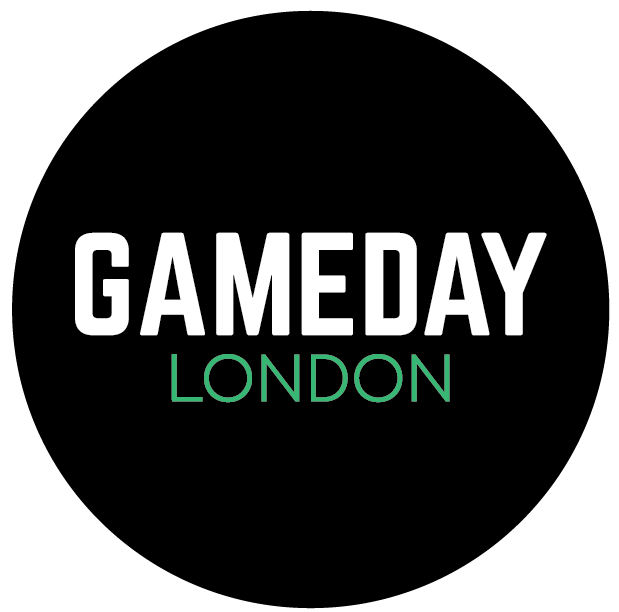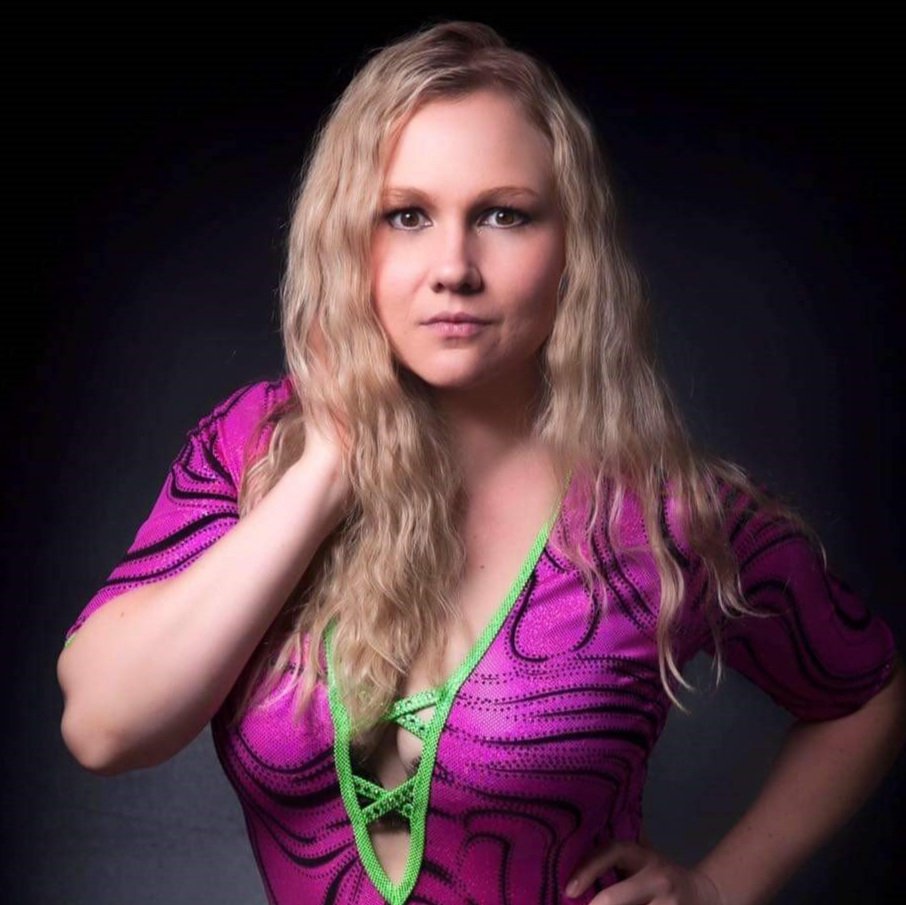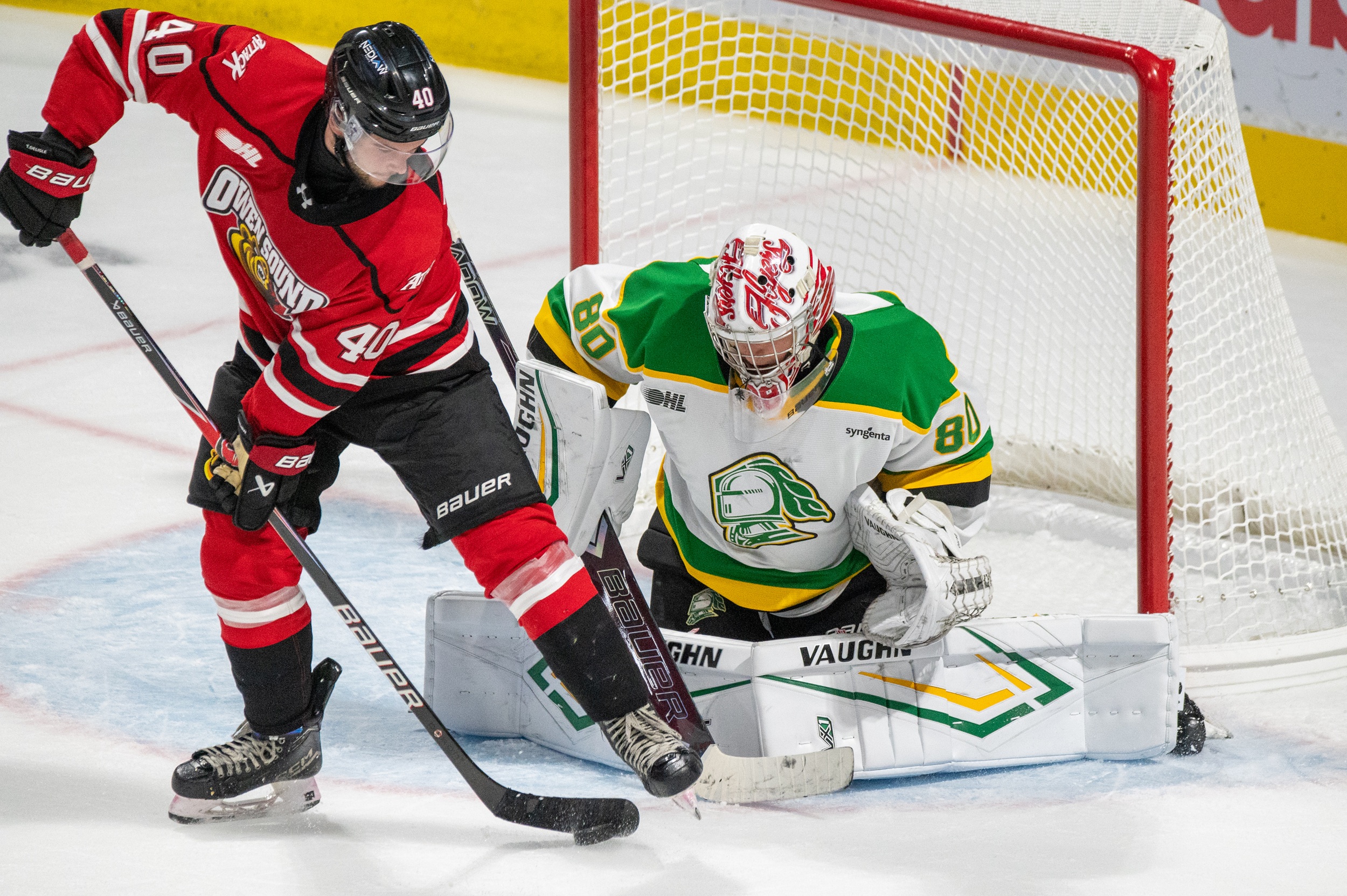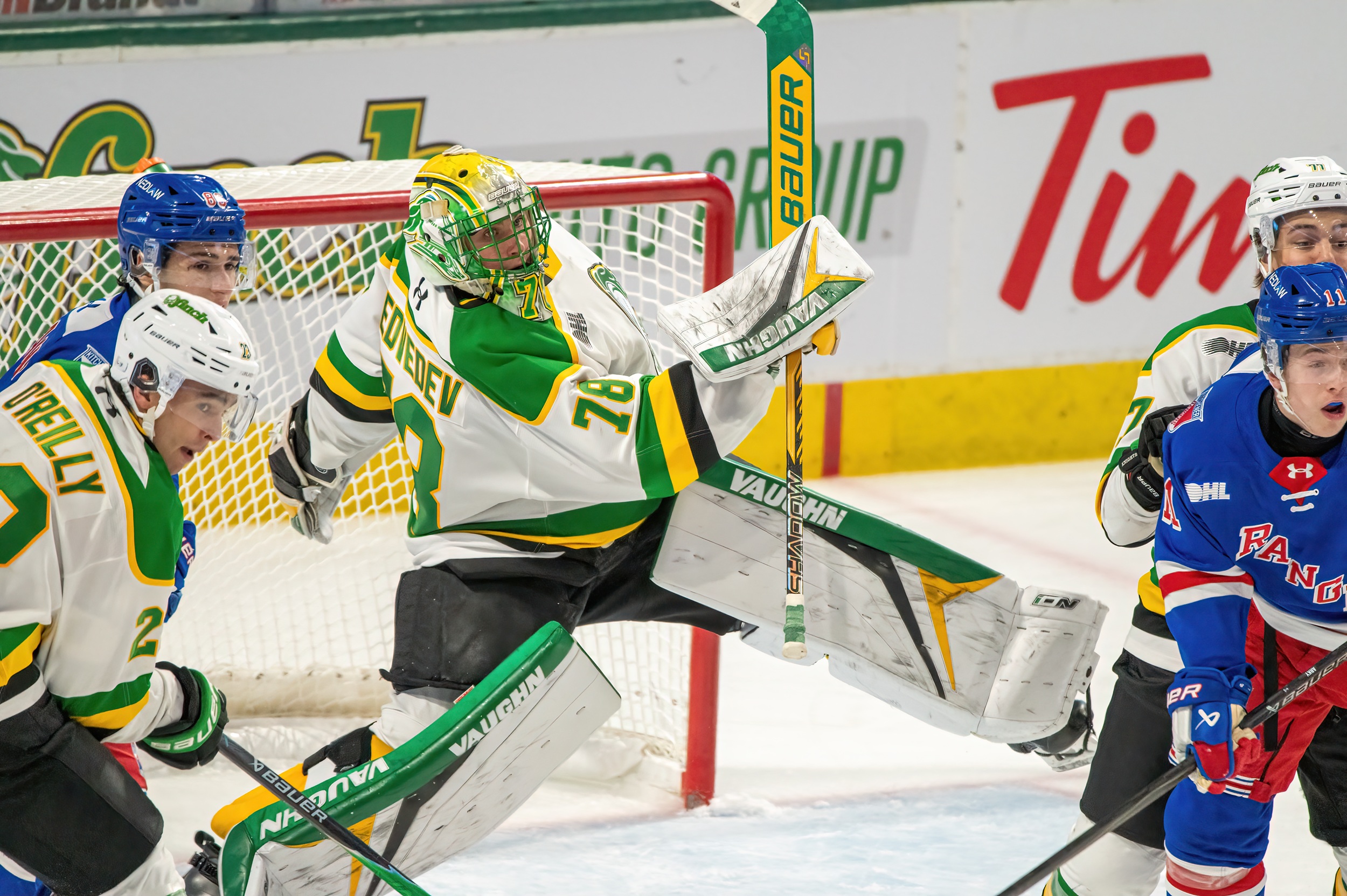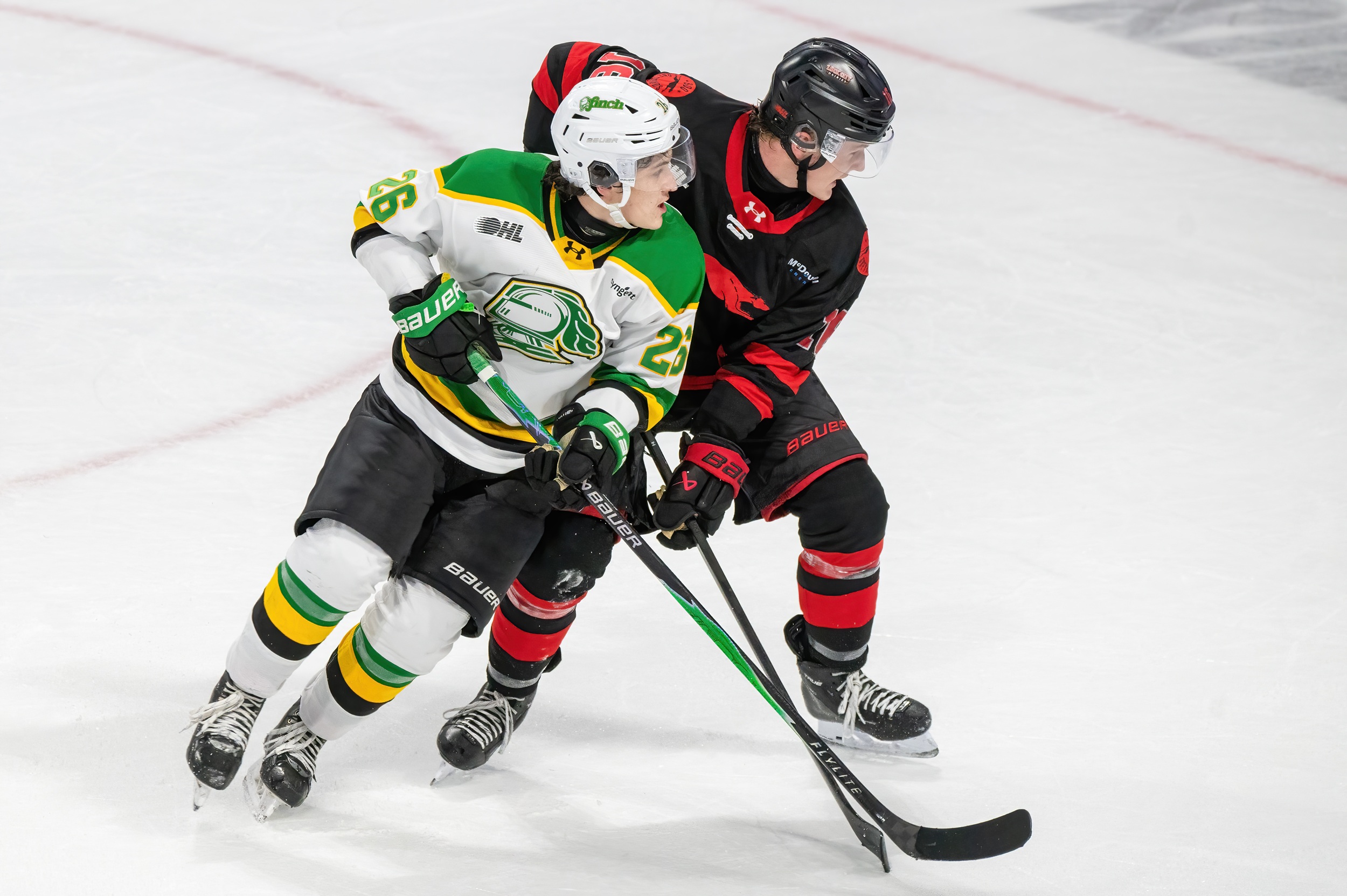|
Getting your Trinity Audio player ready...
|
Alysha Morningstar – aka Leah Von Dutch, aka Leah Vaughan – may be done in the ring (after a career that included appearances on WWE), but she’s not finished with the sport just yet.
Nobody worried about Cruella de Vil’s feelings. Or asked how Mrs. Wormwood took her tea. And certainly, nobody was going to take it easy on Alysha Morningstar.
But that’s life as a heel.
“It took me a bit to understand it. On social media, people would be ripping me apart. ‘She’s a terrible wrestler,’ ‘She’s an awful human,’” the Londoner said. “I had to come to realize that they were invested in my character. This was not about Alysha; this was about Leah – so don’t take it to heart. I eventually stopped reading comments on my YouTube videos because I would get pretty bummed out. I started thinking maybe I was terrible.”
Alysha Morningstar – aka Leah Von Dutch, aka Leah Vaughan – has not set foot inside a wrestling ring for two and a half years, yet she still remembers how the boos sounded. And why not? That’s why she got into the business in the first place.
* * *
London born, Strathroy raised, Morningstar was the second oldest of four girls – the one who had to do physical stuff, like shoveling snow and bringing out the garbage. She liked sports as a kid and played a lot of soccer. She didn’t know what wrestling was until she stumbled upon it channel surfing one day. She was hooked instantly.
The passion grew and everyone in the home knew about it. Her older sister got annoyed with Morningstar for buying wrestling posters as family Christmas gifts. “I think she knew that The Rock poster I got her for our room was really more a gift for me,” Morningstar said.
Her favourite wrestler was Trish Stratus (Patricia Anne Stratigeas), the Canadian fitness model who became one of the most popular female superstars in World Wrestling Entertainment (WWE). She was young. She was blonde. She was Canadian.
“What’s not to like?” Morningstar said. “I was automatically attracted to her and her feud with Lita (Amy Christine Dumas). I thought that feud was real. I thought they hated each other. I was really invested that way.”
And then there was Dwayne ‘The Rock’ Johnson.
Who didn’t – who doesn’t – love The Rock? “I had like a huge crush on The Rock. Trish and Lita got me into wanting to wrestle; The Rock was my dream wrestler.”
Even her sister started getting into wrestling, too, gravitating to stars like Chris Jericho.
Despite the fun, Morningstar never thought her fandom would be put into practice – until her wrestling superfan husband introduced her to the independent wrestling circuit.
“I never really thought it was an actual sport that somebody could do. But I was wrong.”
* * *
Morningstar made her ring debut as Leah Von Dutch against Cherry Bomb (Laura Dennis) on Sept. 10, 2011 in Petrolia, Ont.
Now, that sentence might seem like it has arrived fast in her story – because it did. Way too fast.
The University of Windsor and Fanshawe College alumna had done some sporadic training locally, but she wasn’t prepared for that first bout. She got by on her athleticism.
“I actually had my first match before I was really properly trained. I was able to do all these high-flying moves before I was able to do a proper pin. I was trained all wonky. I didn’t know any of the basics. So, my first match was a bit of a shitshow,” she said.
Professional wrestling matches are preplanned (perhaps a spoiler alert was necessary there) but not scripted. The winner is always predetermined, along with certain plot points, including the opener and closer, as well as a handful of signature moves throughout.
But professional wrestling is more jazz than public accounting. Improvisation, you see, is key, and improvisation skills take time to develop.
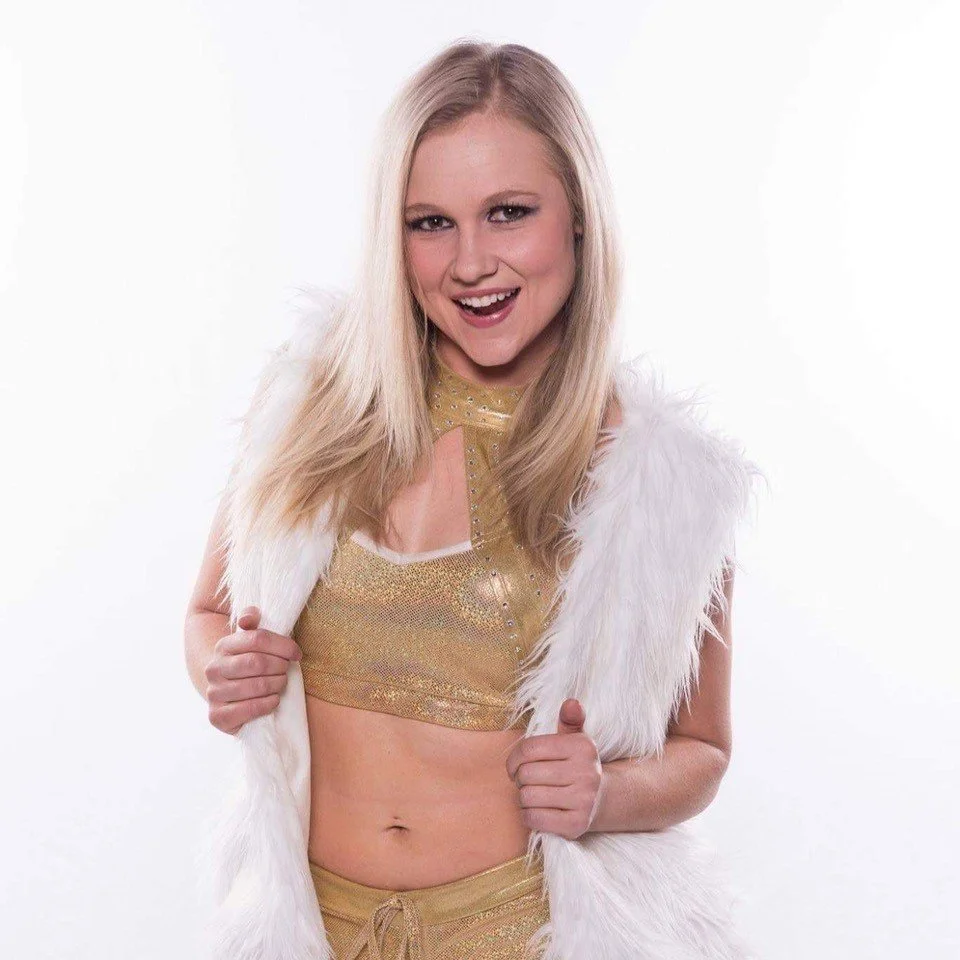
Morningstar was far from perfect in those early days. In that first match, and many afterward, she leaned heavily on her veteran opponents for direction, listening to them in the ring.
“There were times I just forgot everything. The girls would get so mad at me because I couldn’t remember. I was just so nervous and so excited. But there was just a lot of information going on. The girls would be talking in the back, and I was not following it. But that’s part of it, you just have to kind of improvise.”
Her big break came the same month as her awkward debut thanks to an essay contest run by Edge (Adam Copeland), a Canadian professional wrestler who launched his mega-star career after winning a newspaper contest. The Edge-ucational Scholarship asked aspiring wrestlers to pen an essay about why they had what it takes to become a professional wrestler. The winner would begin heading down that path as a member of the famed Squared Circle Training.
Finalists made their cases in person to Edge.
“All the other people who were the finalists with me were saying all these, like, sob stories like ‘my grandpa passed away, so I want to wrestle for his memory,’” Morningstar said. “Then it was my turn. I was like, ‘I want people to hate me. I want people to boo me or cheer me. Doesn’t matter to me which.’ I was just super loud and obnoxious about everything, and I ended up winning it.”
At 24, she moved to Vaughan, Ont., to begin her official training.
* * *
She never looked like a villain – and that was the point.
A dark-eyed blonde with a knowing smile and a sweet voice marked by a hint of a southwestern Ontario accent, Morningstar embraced the dark side in the ring. Pretty-faced-but-two-faced, her wrestling persona was as quick with a compliment up front as she was with an insult or atomic elbow behind your back.
“I’d be choking somebody on the rope, but I’d have a smile on my face,” Morningstar laughed.
It was all fun because it was not her – at all.
“I’ve always tried to be good. I’m not the type of person to go on Twitter and start drama if I don’t agree with something. I just scroll past it. This persona was me living on the other side of that. I would say what I was thinking instead of hiding it. It was fun to do that because I didn’t do that in everyday life,” she said. “I ended up getting booked as a ‘bad guy’ all over the place because fans hated me. It was awesome.
“It’s so much easier to get people to hate you than to get them to like you.”
After starting off with matches in Canada, Morningstar criss-crossed the independent circuit, wrestling for organizations like Chikara in Philadelphia, Shimmer in Chicago, Shine in New York, Ring of Honour in Baltimore, even British Women’s Wrestling across the pond.
She won.
She lost.
She nabbed titled belts. Then lost them just as quickly.
She also changed her name, pivoting to Leah Vaughan as she got more serious. The name had more potential, more star power, she thought.
It was a weird world, a long way from the Forest City where the drama wasn’t reserved for the ring. What happened in private backstage could be just as bad as anything performed inside the ring. “That caught me a little off guard. It was all just so dumb. It felt like high school drama,” she said.
“It was a whole different reality. If you did or said something in that wrestling world and you did the same thing in the real world, it would not fly. I was told so many things like I needed blonder hair, needed bigger boobs, needed to lose weight, needed to shave my arms, needed a tan. I needed this and needed that. It was just so crazy to me.”
* * *
In 2016, Morningstar began training with former wrestler and manager Truth Martini (Martin Krca) in an all-female class. Traveling back and forth between the Motor City and London for three days a week of intense training took its toll.
“It was the craziest training I’ve ever done – train, sleep, wake up, do it again.”
Still working as a long-term care worker in London, she was investing a lot of time in her pursuit, taking time off to train, then again to go on tour. To this day, she is thankful for a supportive employer who let her chase her dreams.
In May 2016, Morningstar traveled to Japan where she continued her training – more specialized than her work back home, with a focus on flexibility, cardio, even gymnastics. There, she trained multiple times a week, then performed shows on the weekends.
“We would take the smallest bus ever and go five, six, seven hours to a show and then come back the same night. It was just really crazy. We would be on that bus forever, set up the ring, do the show, take the ring down, and go back. It was such a hard experience, but it’s something that I’ll never forget.”
It also led to the biggest stages of her career, so far.
She appeared numerous times on WWE as one of Adam Rose’s Rosebuds. On Sept. 8, 2016, Vaughan, as Leah Von Dutch, battled (and eventually lost to) Ember Moon at a WWE NXT event celebrating the next generation of wrestling stars.
A standout star on the independent circuit, she found a supporting role in WWE, from performing in the background pretending to talk or cutting a promo. While that was grueling, Morningstar also worked with the top coaches, jumping into impromptu practice matches with fellow extras with only moments to plan and then perform in the main ring in front of the coaches and WWE stars.
“It was super nerve-wracking. That’s pretty crazy when you have Roman Reigns (Joe Anoaʻi) watching you do a match. It was a crazy time.”
In the WWE, she also found a supportive environment of women wrestlers who took her under their wing.
“It was a really strange time when I started,” she said. “It was still very much that if you’re female, you’re going to do hair-pulling, you’re going to do catfights, you’re going to scratch eyes, you’re gonna fishhook. It was still very much that women were a special attraction. That’s how I was first trained. Why would you do a wrestling move when you can just pull their hair?”
Soon afterward, women incorporated more and more wrestling moves into their matches. It was encouraged and accepted. Mostly.
“A woman’s movement was happening. It was like a revolution. All of a sudden, women were doing all these wrestling moves,” she said about the new role for women in a sport that now sees them as some of its most popular stars.
But it was difficult for Morningstar. She had been trained in the old ways of thinking.
“It had been ingrained in me that it was more important to be a special attraction. But now, the women were getting noticed for doing the wrestling,” she explained. “It was difficult for me to transition over into that mindset, and that’s why I started training in Detroit. I thought I had to up my game. I was great at storytelling. I was great at doing promos. But my wrestling was lacking. I thought it was about time to just focus on the wrestling aspect of it, because having a character is super important, and I felt like I just needed that last piece of the puzzle.”
* * *
Even though she loved it, life as a heel was always weird. Like when you’re selling and signing merchandise after an event for fans. Who should you be while sitting there – yourself or the character?
“I found that difficult. I couldn’t be mean to fans. I just couldn’t do it after the bell. Wasn’t something I could do. So once the once the bell rang and I was done the match, I just went back to being me.”
But in Japan, for instance, she discovered a lot of fans who were “really, really invested in the character” and they would not buy her merchandise.
“They would not buy anything from you,” Morningstar laughed.
Much of that investment carried over into social media, as well. The words would get hurtful, aggressive, even occasionally scary.
“I know it’s easy to be a keyboard warrior, but people sometimes don’t realize they’re not separating the character from the actual person. I don’t know how they do it in the big leagues. I would just turn off all my comments forever. You’re never going to make everybody happy.”
And not all scares were virtual. During one match, a fan came out of the crowd and into the ring and started yelling at her. “I was freaked out. He was really invested in the moment, and it got him arrested.”
Overall, Morningstar loved the independent level, as it gave her room to experiment, create a half step outside the spotlight.
“You could try stuff and screw up and it was fine, whereas it wouldn’t be if you’re on a higher level doing that in front of thousands of people. I know some wrestlers whose first match was on WWE Raw. I can’t even imagine. I did my first match in front of 20 people. I can’t imagine doing my first match in front of that many people, having that many people criticize you.”
* * *
Morningstar, as Leah Vaughan, last stepped into the ring on June 30, 2019, when Jewells Malone retained her PWE Flame title by beating Vaughan after a year and a half absence from the ring to have her first child.
Today, she has two little ones and thoughts of long hours training and hundreds of kilometres traveling away from her family doesn’t appeal to her the same way it did years ago. Besides, she has lived so much already: Traveled the world. Met her fans. Has amazing videos that she can share with her kids one day.
In the past, she has stayed connected to the sport through Tyson Dux’s Wrestling Factory in London and would love to do more.
“It has been pretty awesome. You know, I never made it to that next level. It really does bother me quite a bit that I never made it. But I just feel like I’m not quite finished,” said the now 34-year-old. “It’s hard to say with the pandemic and everything. I don’t think I’ll necessarily go back into the ring and actual wrestle. But maybe refereeing or managing, or even I really love teaching, even though there’s so much I can still learn.
“It’s addicting and it’s not complete yet. I just don’t feel super content with everything, and I don’t feel like it’s a closed chapter quite yet.”
